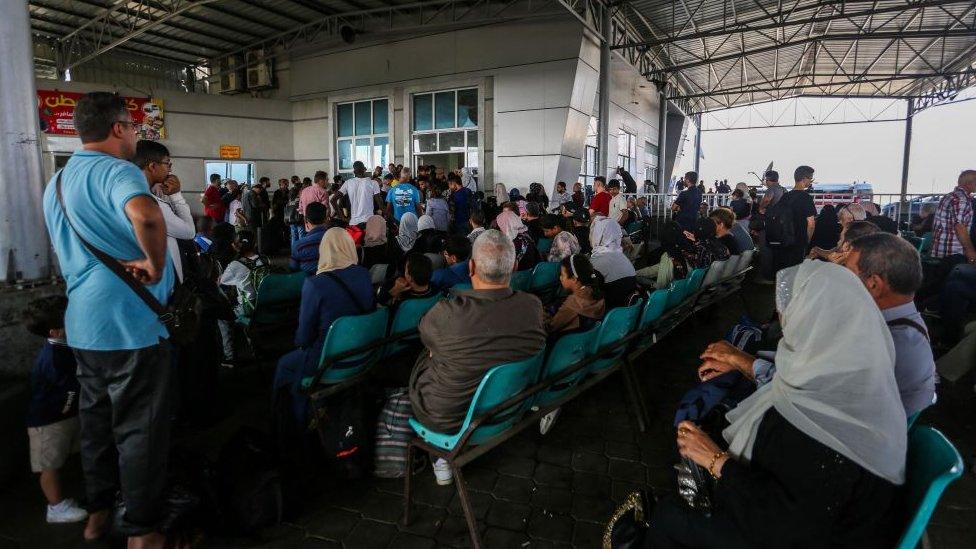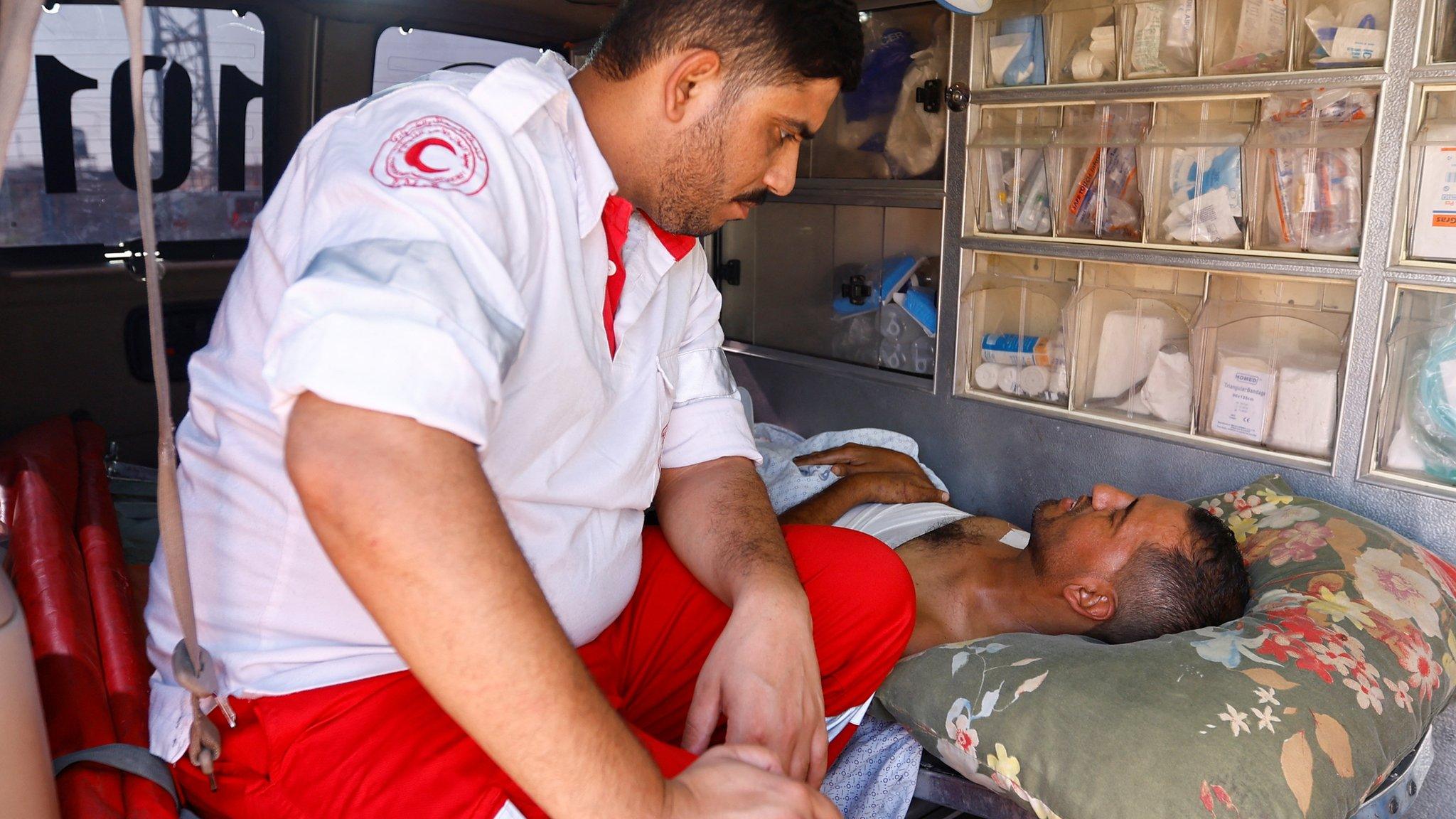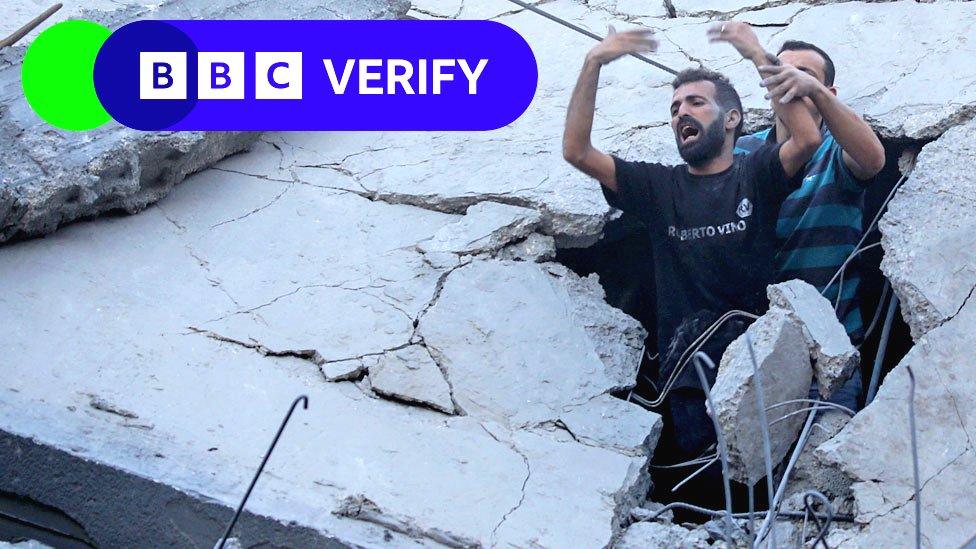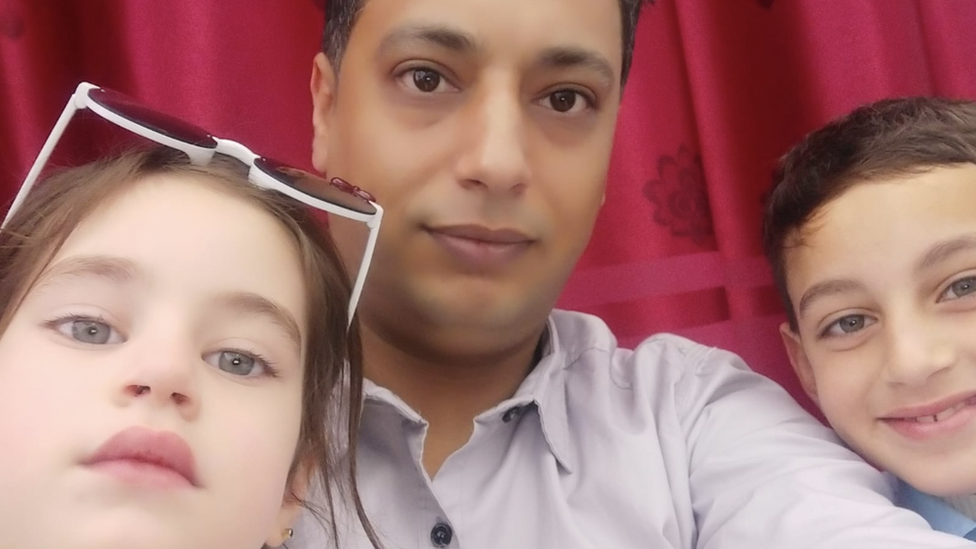Canadians stuck in Gaza as other foreigners leave
- Published

Foreign passport holders waiting to cross into Egypt at the Rafah crossing on 2 November.
Hundreds of Canadians remain trapped in Gaza as foreign nationals from other countries have been able to cross into Egypt.
No Canadian was on the latest list published by Gaza border authorities of those approved to leave on Friday.
One family said they received a call from Canadian officials to be ready at a moment's notice, but have not yet been informed on when they could leave.
Canada has registered about 450 of its citizens who want to leave Gaza.
So far, dozens of Americans have been able to leave in the last three days. People from other countries, including Britain, Sri Lanka, Mexico and European nationals have either left or are on the approved list to leave.
Dozens of seriously injured Palestinians were also allowed to cross into Egypt since Wednesday.
One Canadian has managed to leave Gaza, who was reportedly able to exit "with a third party", although the government declined to give details, citing privacy considerations.
The BBC understands there are about 7,000 dual nationals in Gaza.
In an update on social media late Thursday evening, Canada's foreign affairs minister Melanie Joly said she spoke to her Israeli counterpart, Eli Cohen, and was reassured that Canadians would be able to leave "in the coming days".
"My Egyptian counterpart confirmed their cooperation," Ms Joly said. "Global Affairs Canada will communicate the latest information directly with Canadians."
The lists of those allowed to cross is agreed upon between Egypt and Israel, with embassies from the relevant countries being informed in advance to ensure they can prepare to receive their citizens, Western officials have said.
In total, Canada has provided authorities in the region with a list of about 450 eligible citizens, permanent residents and family members who want to leave the embattled territory.
It is one of the largest contingents of foreign nationals in Gaza, Canadian officials said.
Prime Minister Justin Trudeau was questioned on Thursday on why Canadians had not yet received approval to leave.
"Obviously, the Rafah crossing is an extremely complicated place right now," Mr Trudeau said.
"We're pushing on our friends in Israel and our friends in Egypt, working with Americans and others, to make sure that the Canadian families get on the list," he said.
One Canadian family in Gaza told the Canadian Press that they received a call from officials, external on Thursday telling them to gather their documents to prepare to leave, but they were not given a date or time.
Mahmoud Nasser said he and his family - including his pregnant wife - were sheltering at a refugee camp, a 20-minute ride away from the Rafah border crossing.
"It's kind of a dilemma for all of us," he said. "We're not sure what to do with this situation."
He was told that a bus would be waiting for Canadians and their families on the Egyptian side once they were allowed to cross.
Others say they have received no word yet from Global Affairs Canada.

More on Israel-Gaza war
Follow live: Latest updates
Explained: What is happening in Israel and Gaza, and why now?
History behind the story: The Israel-Palestinian conflict
Americans in Gaza: Anxious wait for Palestinian Americans in Gaza

A spokeswoman for a Palestinian Canadian group that met Mr Trudeau this week told the BBC that many are feeling "very upset and frustrated" that the Canadian government has been unsuccessful in securing safe passage for its trapped citizen
Reem Sultan said that - in contrast to the government's official statements - some Canadian friends and acquaintances of hers in Gaza have not yet been contacted by officials.
She said that some families with relatives in Gaza believe they "are being treated differently" than Canadian citizens who were evacuated from Tel Aviv in the early stages of the war.
According to the Canadian Air Force, more than 1,600 Canadians were flown out of Israel on 19 separate flights by military aircraft, with the last flight taking off on 23 October.
"Now, we're not putting on enough pressure to get our citizens out...many are feeling as though they are not as important," she said. "This is the part that is very confusing and frustrating for families."
Canadians in Gaza have reported that they are facing mounting humanitarian issues, including shortages of fuel, lack of food, and contaminated water amid heavy airstrikes and bombardment from Israeli aircraft and artillery.
"Every minute that passes, people die," she said. "Our families are at risk of dying at any moment."
The group also demanded that Canada call for an immediate ceasefire in the war and a humanitarian corridor to allow food, water and fuel to be shipped into Gaza.
Canada, along with the US, the UK, and EU, has stopped short of calling for a ceasefire, instead pushing for a humanitarian "pause" in the conflict.
The Hamas-run health ministry in Gaza says more than 9,000 people have been killed in the Strip since the beginning of the war.
Six Canadians were killed when Hamas gunmen launched an unprecedented assault on Israel from the Gaza Strip on 7 October, killing more than 1,400 people and taking 242 hostages.
At least two Canadians are still reported missing.
Related topics
- Published2 November 2023

- Published1 November 2023

- Published31 October 2023
